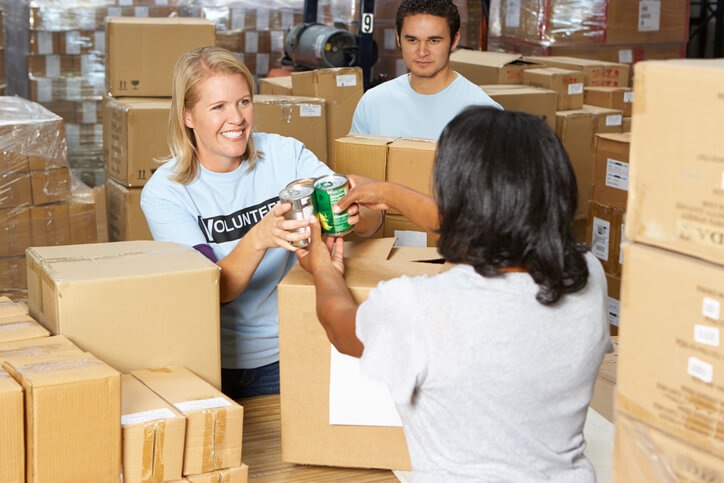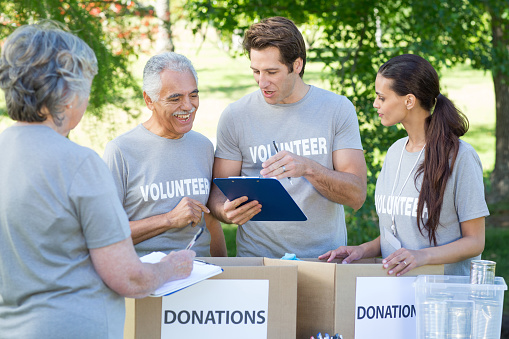Maybe you’re looking forward to retirement as a time when you’ll finally have the opportunity to do all the things that didn’t quite seem to fit in while working and raising your family. Or, maybe you’re still thriving at work and plan to continue for a long time, but are feeling like you want to cultivate and prioritize long-neglected hobbies. Maybe you’re feeling lost, or maybe you just feel like you want to try something new.
Whatever the reason, volunteering is an effective way to reestablish a sense of identity, as well as purpose, in your life.
Among the numerous reasons to spend time volunteering, folks of all ages have reaped proven benefits to their physical well-being, their emotional well-being and the overall health of their communities. Provided you pick the right charity and role for yourself, volunteering can prove to be a rewarding and fulfilling activity throughout your entire life.

The Effects of Volunteering on Your Well-Being
While it’s not hard to imagine that your work helps the organization, community or people you are serving, you may be surprised to find many benefits of volunteering for yourself, too. Volunteering improves longevity and quality of life, and, according to research compiled by the AmeriCorps, plays a greater role in overall health than marriage, income, or education level.
Your Physical Well-Being
Volunteering can prove a fulfilling way to keep yourself active and maintain your physical health, whether you are still working or retired. In fact, a recent study by the Centers for Disease Control and Prevention (CDC) found that volunteering in retirement may actually make you live longer.
Retirement is a time to rest, relax, and engage in meaningful and fulfilling activities that your career may have crowded out. You may not have realized, though, how much of your physical wellness depended on your job — an obligation that kept you active, out and about, and adhering to a structured routine. The same applies for folks who work remote jobs.
Volunteer work can be a great way to increase your physical activity. Larry Gable of Chester, Virginia, who retired from a clerical position 11 years ago, is a prime example of this phenomenon. At age 71, Gable still runs, hikes, and plays golf, largely because he volunteers at a golf course every Saturday and organizes and leads group hikes for members of his church.
“…I feel like my volunteer work has filled a void,” Gable explains. “My days are usually consumed as though I was still working.”
In addition, volunteering can help you manage chronic health conditions more effectively than can medical attention alone. For example, people suffering from chronic pain reported a decrease in symptoms after beginning a volunteer position.
Your Emotional Well-Being
Volunteer work is good for your body, but it also offers many benefits to your emotional well-being. According to a study by CNCS, over 65% of people experienced an increase in meaningful social connections after beginning in a volunteer role. The same study found that 70% of participants who were prone to depression experienced fewer symptoms of the condition just one year after beginning to volunteer.
Tom Stuart, a retiree in Michigan, says volunteering helps him keep his mind sharp, and cites the most beneficial element of his volunteering as his “belief that I am making a difference.” This aligns with what an annual survey of AARP’s Experience Corps participants found: almost 100% of Experience Corps volunteers felt their volunteer work provided them with “a sense of life purpose.”
If you feel like you’re experiencing a lack of purpose, whether working or retired, volunteering can be a satisfying way to reintroduce meaning into your life. Dorothy Stuart, an 81-year-old retired teacher and homemaker, began volunteering to satisfy her “need to contribute and fill some empty time with positive activities.”
In addition, volunteering provides an excellent outlet for meeting new people, building new relationships, and making and maintaining friendships. Mrs. Stuart explains that one of her favorite aspects of volunteering is “being with people for a purpose. Most of all, I love the interaction with people.”
The Benefits of Volunteering for Your Community
If you’re looking for a way to not only improve and maintain your own well-being, but also the health of your community, volunteering may be for you. The practice improves the global economy by helping to reduce government spending and increasing economic output. Put simply: your role as a volunteer can make a significant impact on the economy.
More tangibly, you can help make your own neighborhood safer and more cohesive, and contribute to a more concerned and involved citizen base. You also can help support local educational institutions and improve the environment of your local community.
Choosing the Right Charity
If you begin a volunteer job with the assumption that volunteering, regardless of the role or organization, is inherently fun and fulfilling, you may be in danger of disappointment. Choosing the right charity to volunteer for is an important part of the volunteering process.
As Robert Laura, author of The Naked Retirement, writes at Forbes, “One way to better define how and where you want to spend your time is to ask yourself, ‘what disturbs you?’ What stresses you out and causes you to think, ‘I need to do something about that.'” Be sure to find a cause and organization that aligns with your answers.
For example, Gable, a Vietnam War veteran, knew that “being a veteran myself, I wanted to help my fellow veterans.” To satisfy his desire, Gable spent five years volunteering at McGuire Veterans Hospital, where he helped veterans “have a less stressful day by helping them maneuver through the huge complex with the least amount of difficulty.” This role proved a good fit for Gable, as it required him to help direct patients to their designated appointments, combining his background as a veteran with his logistics experience in his career.
As you consider where you might want to volunteer, remember that no organization is perfect; many have flaws and limitations. It’s important to recognize these shortcomings and be realistic about them. It’s also important to know how to get out if needed. Yes, you want to help, but your volunteer experience needs to be fulfilling for you, too. When you begin volunteering at an organization, make sure you understand what the process would be should you need to withdraw your services.
Finally, keep in mind that some charities offer benefits to volunteers, such as discounts, grants, or scholarships. Consider what trade-offs you might enjoy in addition to the fulfillment volunteering will likely provide.

Finding the Right Role
Finding the right volunteer job can be just as important as finding the right organization. To help determine what kind of volunteer job you might enjoy, ask yourself: Do I love what I do, or did while working, and desire something similar, or am I craving something new and different?
A volunteer job can be a great place to use skills you already have or to learn new ones. Mr. Stuart usually opts for roles that allow him to use the skills and knowledge he obtained at school and in the workforce. “I usually agree to volunteer when asked if I feel that my experience would be helpful, decline otherwise,” Stuart says.
Gable chooses volunteer roles based on the activities he enjoys, like golfing and hiking. An avid golfer since his early teens, Gable recalls, “I had no one to coach or mentor me when I started and I thought maybe I could help out young golfers during my later years in life.” Gable spent eight enjoyable years helping young golfers develop their skills.
To aid in your decision, ask your friends, family members, and neighbors to help identify what you’re good at, what you enjoy, and what your community seems to need. Consider that some jobs require training, and ask yourself if you’re willing to undergo the process. Once you’ve narrowed down a role or two you think you’d enjoy, start with a small time commitment before committing long-term, in order to make sure it’s a good fit.
For additional help finding a volunteer job, consult All for Good or Volunteer Match.
As you search for volunteer roles, keep in mind that most organizations need the most help in early spring and summer, and are more likely to have the resources to train new volunteers during those times, as compared to, for example, the holiday season, when charities are often inundated with more volunteers than they can use.
You’ve gone through most of your life with a purpose or goals, whatever they may be; go to school, serve your country, start a family, advance your career. And through it all, personal interests and hobbies are often forgotten or deprioritized. And if they’ve been neglected long enough, it might be difficult even to remember what they were. But volunteering can be a great way to find meaning and fulfillment, wherever you are in life.







OK, get ready! I crochet in group that donates to charity. Volunteer for the church as librarian as well as cemetery record keeper/sales/responder to questions. Also in church I belong to several ‘small groups’ of women who discuss various books we read and pray about. Just beginning to join a group who volunteer to take the eucharist to the homebound. Also attend Adoration every morning except for Sunday, from 5:30 am to 6:30 am. Am also a new member of the Jackson City Cemetery Committee. Part of a group of friends that meet every Tuesday for tacos and laughter. Am I busy enough for an 85 year old?
I volunteer 2 days a week at my grandsons elementary school. We work on any projects the teachers may need help with. Very sayisfying.
I also volunteer at my granddaughters junior high whenever they need help. Lately it’s been 1 to 2 days a week.
I volunteer at my church from 8 to 12 hours a week, Feed My Starving Children 2 hours a week, and tutor elementary school children after school at a community center and been doing that for 15 years. I am 88 years old.
It’s exhausting to search out educated folks on this topic, however you sound like you understand what you’re talking about! Thanks
I already dovolunteer workat the SENIOR CENTER HERE IN BERKELEY SPRINGS, W. VA.
Volunteering seems like a very good way to have a meaningful retirement. Unfortunately, many retired people don’t have enough insights about volunteering and its advantages. It would be great to have more awareness in this field.
I really like what you said about how volunteering can help your mental and emotional health. This would be really helpful for my grandma who wants to volunteer more. It would be really helpful for her to work with a professional who can let him know about opportunities.
Thank you for reading, Jenna!